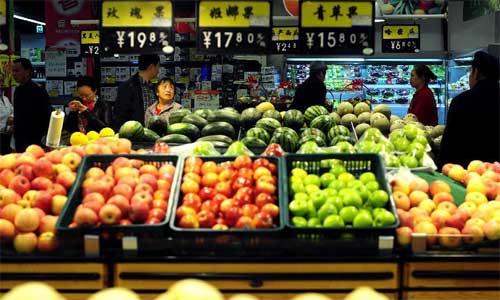HOME >> SOURCE
UK’s ferocious grocery war will be fought on more than prices
By Global Times Source:Global Times - Reuters Published: 2020/1/12 20:28:43

People choose fruits at a supermarket in Taiyuan, capital of north China's Shanxi Province, April 8, 2014. China's consumer price index (CPI), a main gauge of inflation, increased 2.4 percent year on year in March, up from 2 percent in the previous month, official data showed on April 11. Photo: Xinhua
Britain's grocery wars are growing ferocious. Big supermarkets are losing market share to discounters and the biggest of them all, Tesco, said on Thursday that its domestic sales barely rose over Christmas and New Year's holidays. Improving online services and stocking sought-after premium goods may do more to halt the rot than trying to sell products ever more cheaply.Price cuts have so far been the main response to the inroads that Aldi and Lidl have made. Tesco launched a fresh round of price cuts in January and said a typical basket of 21 festive products was 2.28 pounds ($2.98) cheaper in the weeks before Christmas than a year earlier. And J Sainsbury Chief Executive Mike Coupe has frozen the price of around 1,200 products that customers buy most often for at least eight weeks.
But cutting prices isn't enough. Tesco's market share fell to 27.4 percent in the 12 weeks to the end of December 29 from 28.1 percent two years earlier, according to Kantar data.
Meanwhile, Aldi and Lidl's combined share rose to 13.7 percent from 11.8 percent over the same period.
Fortunately, retail sales figures for Christmas offers the biggest four supermarkets some alternatives to cutting prices. For example, Sainsbury's market share fell less than its main rivals, partly because of online sales. Revenue from this source grew 5 percent in the 15 weeks to January 4 from the previous year and now accounts for a fifth of total sales. Tesco is hoping to jump on the bandwagon and said in October it planned to double online sales capacity. Customers are also willing to pay more for higher-quality products. Upmarket Waitrose saw its market share hold steady at 5 percent, Kantar said.
Keeping up the latest fads will also help. Brits cut back on seasonal classics such as rich Christmas puddings and drank a bit less alcohol overall, opting instead for low and no-alcohol beer, wine and cider. Tesco is tapping into healthier eating trends and launched 68 plant-based food lines this week.
A mix of these tactics may be more effective in fending off discounters than cutting prices ever lower and will certainly be less harmful to grocers' profit margin.
The author is Dasha Afanasieva, Reuters Breakingviews columnist. The article was first published on Reuters Breakingviews. bizopinion@globaltimes.com.cn
Posted in: INSIDER'S EYE